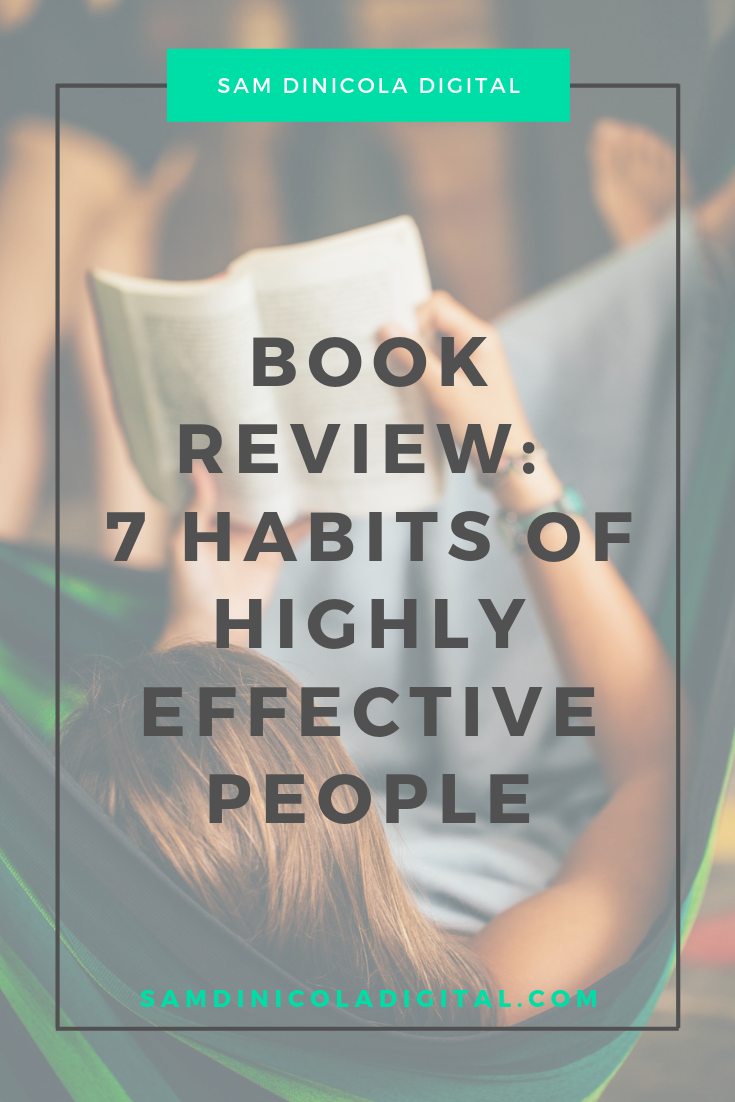Book Review: 7 Habits of Highly Effective People
I made a goal for 2018 to read more self-improvement and business books. I'm a big reader but I prefer fiction over non-fiction so most of my reading is more for pleasure. This year I wrote out a list of a bunch of non-fiction books in the self-improvement, business, self-help realm to sprinkle in between my guilty pleasure reading. I took that a step further and reading one for one fiction and non-fiction books starting in Q2.
One of my first self-improvement books of the year was The 7 Habits of Highly Effective People. Written in 1989, this book is considered a classic in the self-improvement genre and has sold more than 25 million copies worldwide. The original book also inspired many spin-offs including The 7 Habits Of Highly Effective Teens and The 7 Habits of Highly Effective Families.
I have to say that I really wasn't a fan of this book. I know that it has received a ton of praise and that it's standard recommended reading when it comes to self-improvement books but I found the anecdotes to be unrelatable and unrealistic.
Covey includes a lot of stories about how he uses the 7 habits to better relate to his spouse and his children but some of the anecdotes about his children are clearly enhanced or even completely created, just to conveniently serve the book.
The 7 Habits in this book are:
Be Proactive
Begin with the End in Mind
Put First Things First
Think Win-Win
Seek First to Understand, Then to Be Understood
Synergize
Sharpen the Saw
Habit 1: Be Proactive.
This section basically focuses on the fact that we control how we think and act. Instead of framing our experiences as things that happen TO us due to circumstances beyond our control or in our "circle of concern", we can be proactive and do things to help change or affect the things that are in our control or our "circle of influence."
I think a lot of people can relate to this section because we've all known someone who has a "hard life" because everything happens to them, and they are just a victim. It's an annoying and helpless outlook on life and we can all benefit from being more proactive in our lives.
Habit 2: Begin with the End in Mind
This section says that we should begin with the end in mind in everything we do. Think about the life you want and reflect on if your actions and goals are going to help get you to the life that you want. If you are clear on what you want, you can tailor your activities around reaching that goal. In order to do this, Covey says that we should be principle-centered. Developing a strong set of principles from which you can build all of your actions and your goals will help ensure that you are building and living the life that you want.
This is a great section for goal setting. If you are setting goals without thinking about the bigger picture of what you want out of your life and your principles, then you may not be setting the right goals or focusing on the right tasks for you. By deciding on what your principles and values are, you can then set goals and tasks that help you live a life that is loyal to your principles.
It's incredibly easy to get caught up in an activity trap, in the busyness of life, to work harder and harder at climbing the ladder of success only to discover that it's leaning against the wrong wall."-Stephen Covey
Habit 3: Put First Things First
In the section on putting first things first, Covey talks about setting priorities and daily tasks around activities that will get you closer to your goal, not necessarily what seems the most urgent. Covey outlines a quadrant for different types of activities. There's Quadrant 1 which is urgent AND important tasks. Quadrant 2 which is not urgent BUT important tasks. Quadrant 3 which is urgent but not important tasks, and Quadrant 4 which is not urgent and not important tasks. Quadrant 2 is where you want to spend most of your time. These are the activities that you will benefit from in the long term. Quadrant 1 tasks are things that you will have to take care of when they come up because they are urgent and important, but you don't want to spend all of your time here because you'll constantly be putting out fires and dealing with crisis management. Quadrant 3 is full of activities that you want to minimize when you can because these are often items that are urgent, but they aren't important so you're really not benefiting by focusing on them. And Quadrant 4 activities are probably the tasks you find yourself completing when you're feeling unfocused or lazy. You want to stay out of Quadrant 4 as much as possible because it's not going to get you anywhere.
I liked this section because sometimes I have trouble prioritizing. If I don't feel like working, I might turn to Quadrant 4 work, just so that I can say I'm getting some work done. But that work, because it's not urgent and not important, isn't really going to move the needle to get me closer to my goals. By thinking about your tasks in the context of the 4 different quadrants you can try to make sure you're staying mostly within Quadrant 2 and working in Quadrant 1 as needed.
Habit 4: Think Win-Win
This section has to do with interpersonal relationships and working with others. You've probably heard of a lose-lose situation or a win-win situation before but Covey breaks it down further to describe 6 different outcomes of problem-solving. The best solution is win-win, where all parties reach a solution that they are happy with and that they feel they benefit from. The other solutions range from compromises to one or both parties leaving the situation unsatisfied.
This section is good if you struggle when working with others or you are trying to come up with a solution that works for all parties but you are struggling. By approaching a negotiation from a win-win perspective, you work to find a positive solution that both parties are happy with. This is better than a compromise which one or both sides might not be thrilled with or a win-lose solution which the losing side probably isn't jazzed about. It's a better way to approach challenges and find solutions.
Habit 5: Seek First to Understand, Then to Be Understood
The section on Habit 5 encourages us to listen and understand another person or point of view before we try to make our opinion understood. Most of us listen while we wait for our chance to reply. We should seek to deeply understand someone else before we try to make them understand us.
I liked this section because I tend to have trouble listening. In conversations, I try to engage and share my input, but that can result in my not deeply listening and understanding what someone else is saying. I know that I need to work on deep listening and this section gave some tips on how to do that.
Habit 6: Synergize
Even though I hate that synergy is some ridiculous business buzzword that is used way too much in corporate America, this section is all about recognizing different thoughts and opinions and learning from them. If we appreciate that there are differences in people's perspectives, we can develop a win-win situation to create new possibilities.
This section was a bit wishy-washy for me. It basically just combines the previous sections and says that you should value opinions that are different from your own and use those differences of opinion to come up with better solutions than you otherwise would on your own. While all of that makes sense, it doesn't really offer new insight.
Habit 7: Sharpen the Saw
Habit 7 encourages you to spend time renewing yourself or "sharpening the saw." By improving and exercising our physical dimension, spiritual dimension, mental dimension, and social/emotional dimension, you can more effectively practice the other 6 habits.
I liked this section because it walks through the different ways you can exercise all 4 dimensions which are very important parts of anyone's life. I'm all about self-improvement, so Habit 7 basically encourages you to take a holistic approach to self-improvement.
Overall, this book was kind of a dud for me. I'm sure the ideas it presents are covered in many other self-improvement books This may have been the father of many other important books out there, but the writing style (very dry) and the anecdotes (kind of lame) kept me from connecting to the writing and this author. This is a classic when it comes to self-improvement books so if you have some time, you can skim it but otherwise, I wouldn't recommend.
Do you want to see more reviews about books that benefit hustlers?















